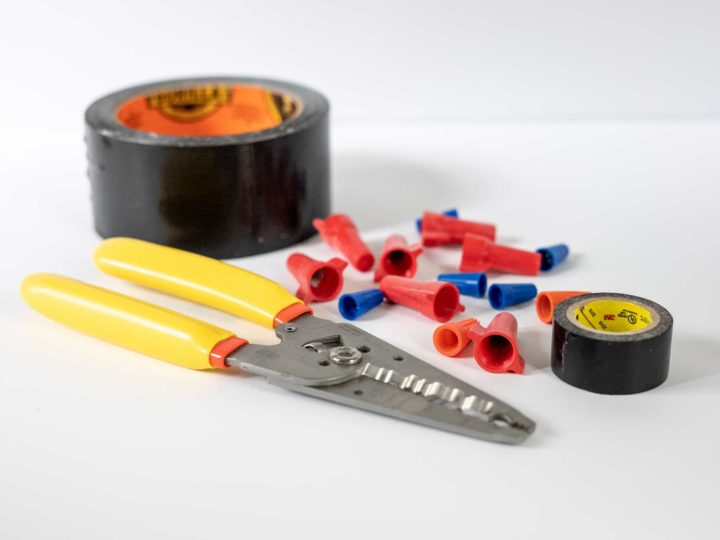Sometimes, substituting one tool for another makes sense – but that’s not the case when it comes to electrical work. You might be tempted to use duct tape if you’ve run out of electrical tape, but you really shouldn’t. I’ve done a LOT of wiring and re-wiring in my time as a DIYer (I ran every single outlet and tons of new lights in our kitchen renovation, which you can read more about here), and while I’d sometimes feel comfortable substituting tools (like using a claw hammer instead of a prybar) when it comes to electrical work, it’s better safe than sorry.
Never use duct tape instead of electrical tape. Tape used in electrical work should have high adhesion, resistance to corrosion, be flame retardant, be able to withstand up to 600 volts, and should insulate and protect against the elements. Super 33+ electrical tape has all of these properties, and duct tape has none.
Table of Contents
- What Happens If You Use Duct Tape Instead of Electrical Tape?
- What Are The Differences Between Electrical Tape and Duct Tape?
- Can Electrical Tape Catch Fire?
- Which Electrical Tape is Best?
- How To Properly Use Electrical Tape
- Alternatives to Electrical Tape
There are a few other things you’ll want to be aware of when considering using duct tape instead of electrical – including what would happen if you did, what all the differences between electrical tape and duct tape are, which electrical tape is best, how to properly use electrical tape, and alternatives to electrical tape.
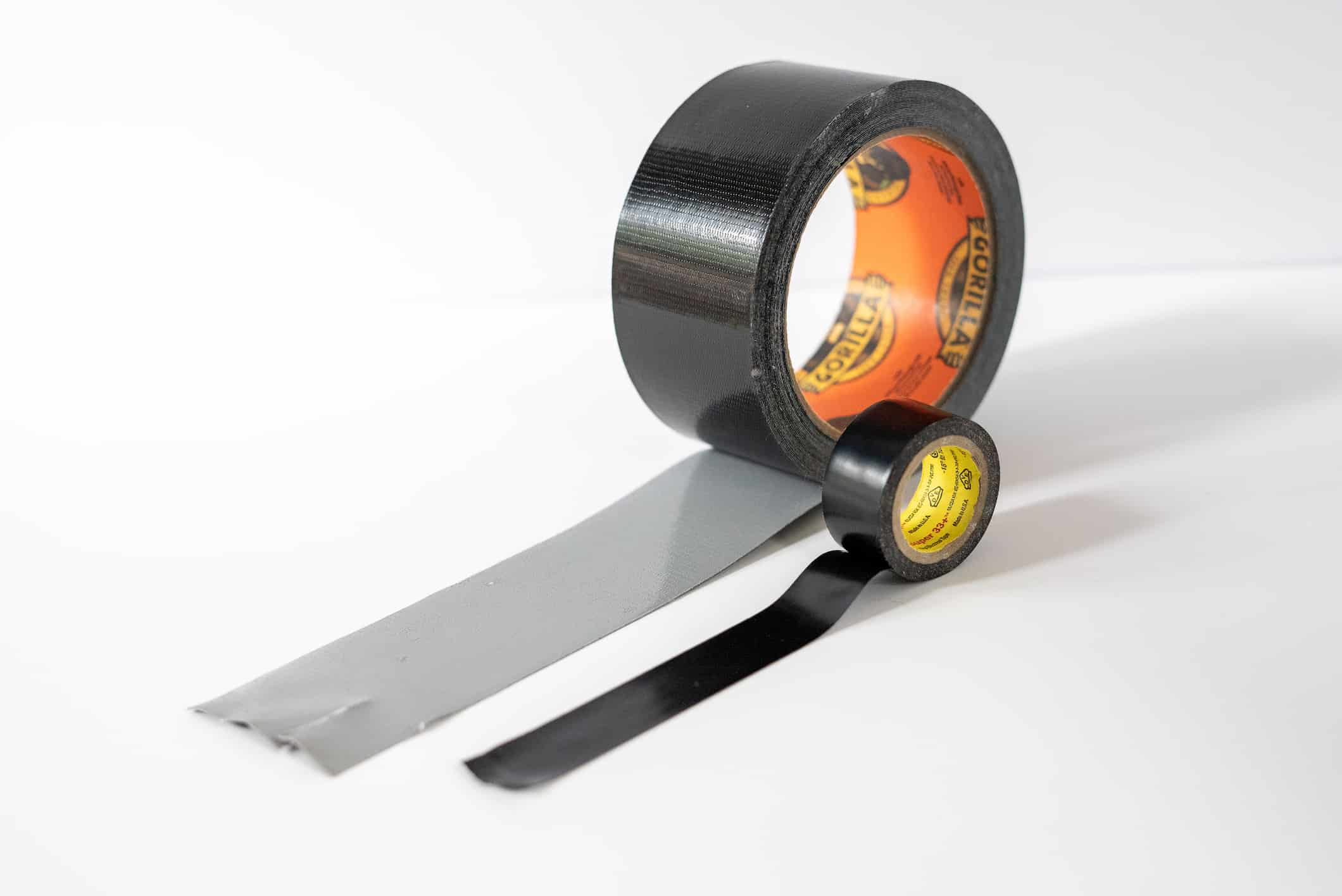
What Happens If You Use Duct Tape Instead of Electrical Tape?
Let’s say you ignore all of the warnings and use duct tape instead of electrical tape – what would happen? Immediately, probably nothing. But very shortly after, you’d be able to feel heat start to build up from the electricity, and might notice the adhesive start to melt and get gummy. If left long enough, the fibers duct tape uses for strength would eventually catch fire. If you’re even considering using duct tape instead of electrical tape, don’t do it. It simply isn’t safe.
Duct tape is NOT electrically insulating and offers no protection against live currents, no matter how small. It is flammable and degrades quickly under adverse conditions.
What Are The Differences Between Electrical Tape and Duct Tape?
Adhesion
Duct tape is designed to adhere to a huge range of materials – it will stick on nearly everything from wood to brick. Electrical tape, on the other hand, is designed to stretch and stick to itself, which you probably know too well if you’ve ever lost control when trying to cut it. it sticks incredibly well to insulated wiring, which is it’s main application.
Colors
Duct tape comes in pretty much any color you could ever want – I actually used a bunch of different colors to label moving boxes when we moved from Texas to Kentucky, and they were super helpful! But duct tape colors are cosmetic, not functional.
Electrical tape, on the other hand, is usually black. If you are able to find other colors, know that they generally correspond to traditional wire colors: white is neutral, green is ground, etc. RS Components has a really interesting article on electrical tape colors- consider giving it a read if you’d like to know more!
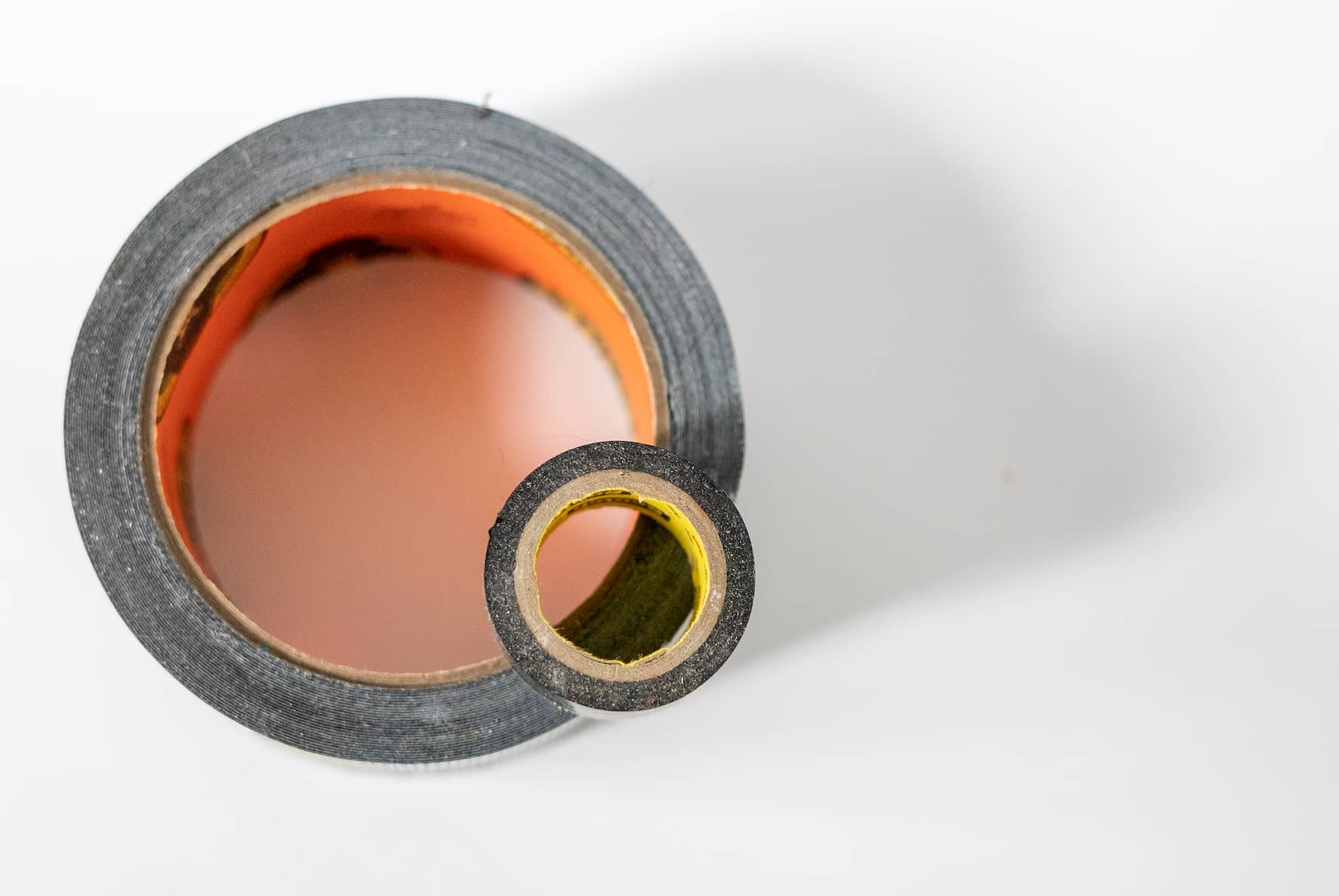
Materials
Electrical tape is made of stretchy vinyl or PVC, and duct tape is usually made of a thin polyethylene-coated cloth with fibers interspersed to make it easy to tear without tools and help with strength.
Durability, Heat Resistance, and Moisture Resistance
Duct Tape, though strong at first, can degrade pretty quickly, especially if it’s exposed to water or heat. Electrical tape, on the other hand, is incredibly durable and can withstand both water and heat (though it is not considered waterproof). The shelf life of electrical tape is about 5 years, but your mileage may vary – you’ll know it’s no good anymore if it seems brittle or too gummy.
Strength
This is pretty much the only category where duct tape wins – the fibers that are integrated into the tape make it very strong…but that’s not usually a concern when working on electrical projects. Electrical tape doesn’t need to be strong against tensile stress, since its job is to insulate, not adhere.
Price
Electrical tape runs from $0.03/ft for a super-budget option to $0.07/ft for professional-grade tape. Duct tape runs from $0.12/ft from craft-style duct tape to $0/19/ft for super tough and wide (but not HVAC approved) duct tape.
As you can see, the cost difference between an off-brand, untested electrical tape and a solid, brand-name one is small – I always go for the good stuff. It’s worth the peace of mind.
| Duct Tape | Electrical Tape | |
| Electrically Insulated? | No | Yes |
| Fire Resistant? | No | Yes |
| Durable in Adverse Conditions? | No | Yes |
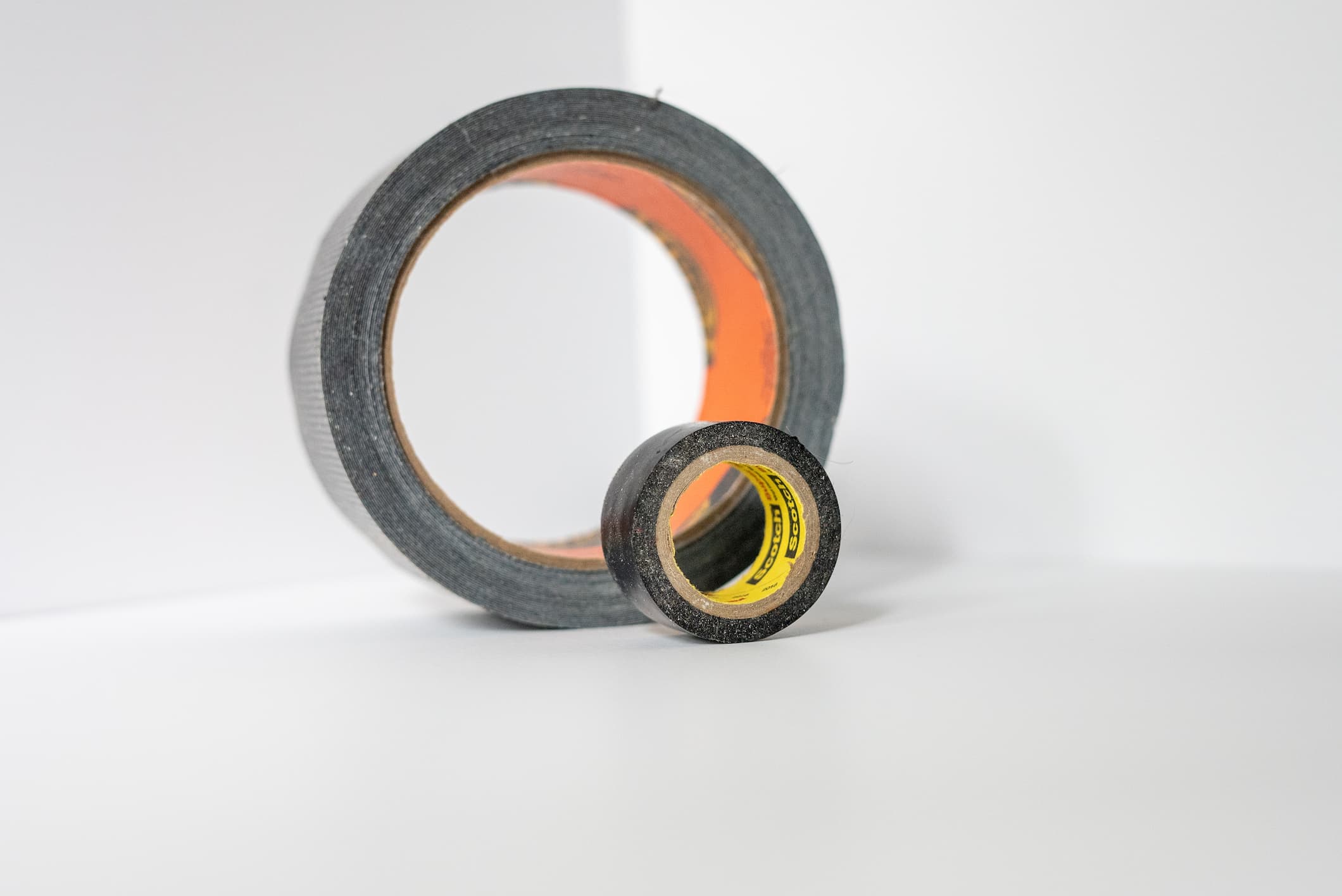
Can Electrical Tape Catch Fire?
Anything can catch fire if heated up enough – including electrical tape. Most of today’s electrical tapes go up to 80 degrees Celsius or around 220 degrees Fahrenheit. Nearly all home electrical applications are never going to reach those temperatures, so you’re safe using any of the reputable brand names of electrical tape.
Which Electrical Tape is Best?
The short answer is Scotch brand Super 33+ electrical tape – it’s a bestseller for a reason, and it’s what I use in nearly every single DIY electrical application (which you can see by my very small leftover supply below!). If you’re wondering if it’ll work in your particular case, read on.
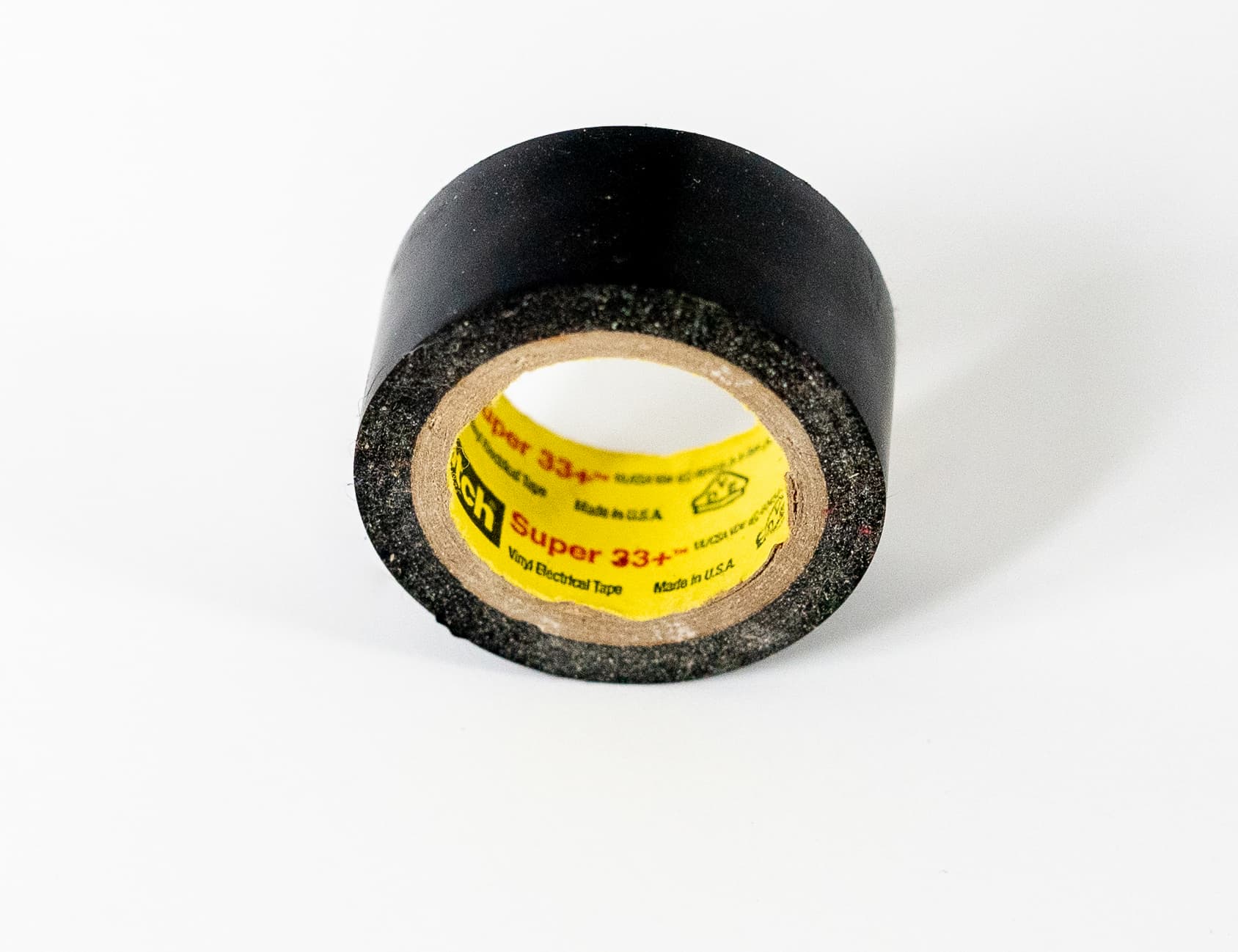
33+ vs 88+
There are two main types of electrical tape – Super 33+ and Super 88, with Super 88 being the more robust of the two.
The main difference between Super 33+ electrical tape and Super 88 electrical tape is the thickness. Super 33+ is 7 millimeters, while Super 88 is 8.5 millimeters. 3M actually has a pretty stellar comparison chart that could be helpful if you’re trying to decide.
For most people and most applications, Super 33+ is plenty, and it’s not worth upgrading to Super 88.
How To Properly Use Electrical Tape
To use electrical tape properly, it should be used in addition to wire nuts and other electrical-specific fasteners. It’s great for adding an additional layer of protection, but should never be used to ‘hold in’ wires into a wire nut – the wire nut itself should do all of the holding. If it won’t hold, you probably need a different size wire nut – it should grab on securely and not pull out.
Think of electrical tape as a non-permanent patch. It’s a great band-aid, but should never be used to make major repairs – it just isn’t enough. You should never use electrical tape to make permanent connections between two wires, like in a light switch or junction box.
When using electrical tape, I like to start by testing my wire cap, checking for a strong grip on the stripped wires, and then I wrap the wires together, being sure to overlap my tape. I keep a medium-strong pull on the tape at all times to make sure it’s wrapping tightly.
Do You Have To Use Wire Nuts, Or Is Electrical Tape Enough?
Wire nuts are necessary, not only from a safety standpoint but likely also from a local building and electrical code standpoint, too. It is never acceptable to twist two wires together and cover them in electrical tape – wire nuts are needed. Plus, if you have any inspections on your work, your inspector WILL fail you if you have connections made with just electrical tape.
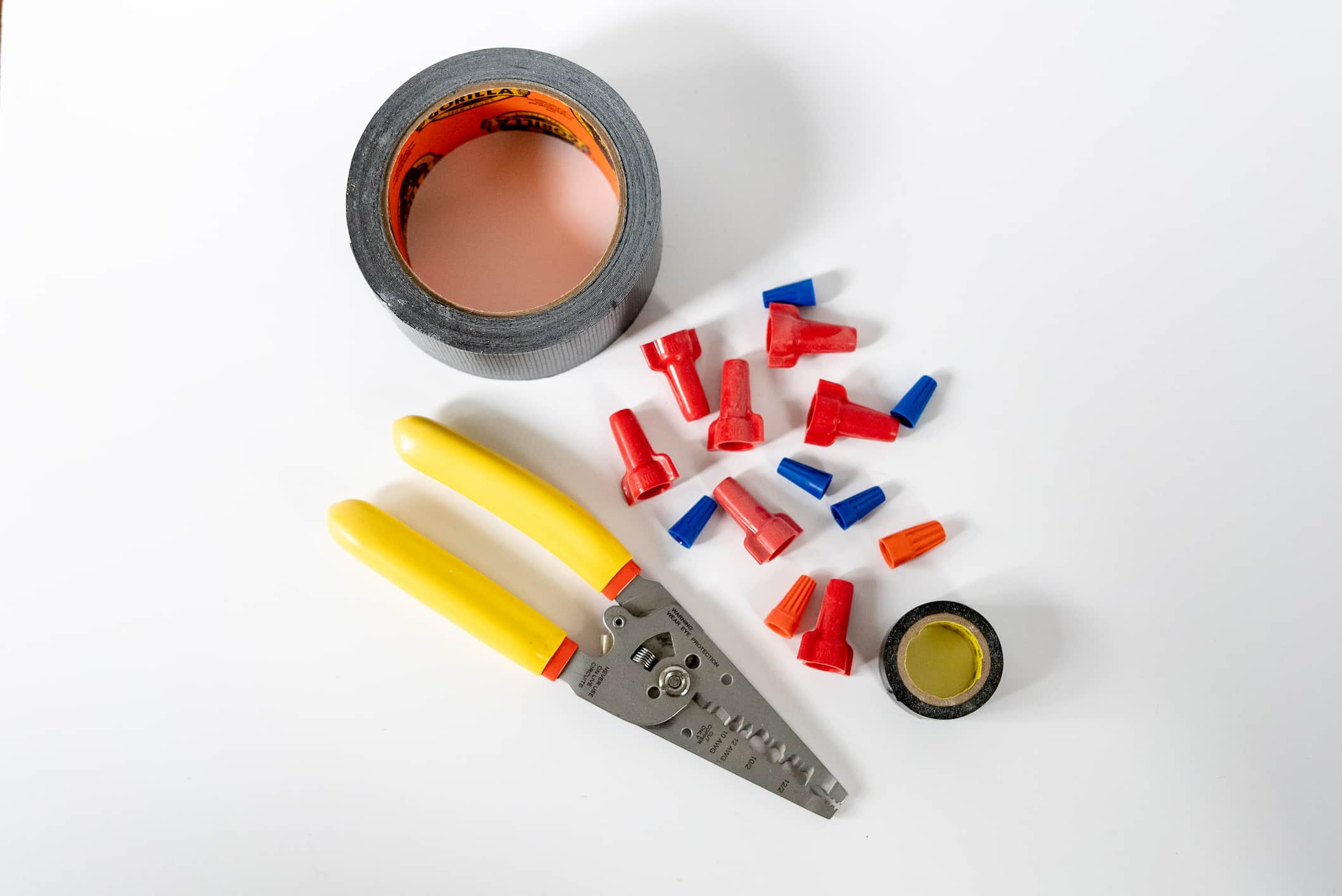
Alternatives to Electrical Tape
Heat Shrink Tubing
If you’re short on electrical tape but happen to have heat shrink tubing around, you’re in luck! It’s one of the few items that you can use instead of electrical tape. That being said, heat shrink tubing is generally used in larger applications with thicker gauge wire, and you’ll need a heat gun to properly shrink it.
Just remember – connections in wiring should only ever be made within an electrical box. In other words, you can’t just heat shrink two pieces of wire together, drywall over it, and call it a day…every electrical connection MUST be in an electrical box.

Wire Nuts
The same can be said for the other alternative to electrical tape – wire nuts. Wire nuts are insulated caps that twist onto the end of a stripped wire, and there are various sizes. I tend to keep a bunch of sizes with me for any electrical project I’m working on since depending on the wire you’re working with, some wire nut sizes ‘bite’ the stripped wire better than others.
Scotch Tape, Masking Tape, and Other Tapes
You should NEVER use scotch tape, masking tape, or any type of tape other than electrical tape in an electrical application. Other tapes don’t have the necessary coatings, insulation, etc. to withstand an electrical application.

